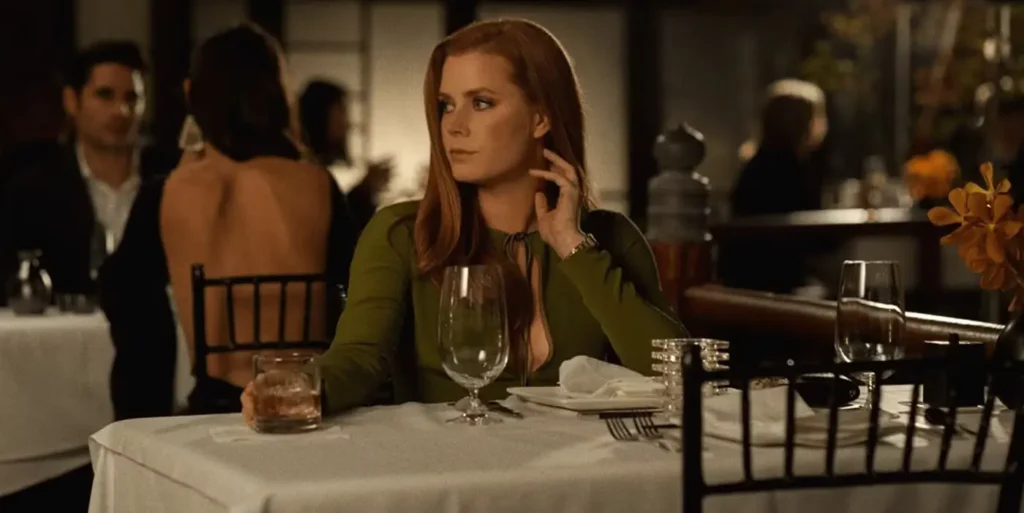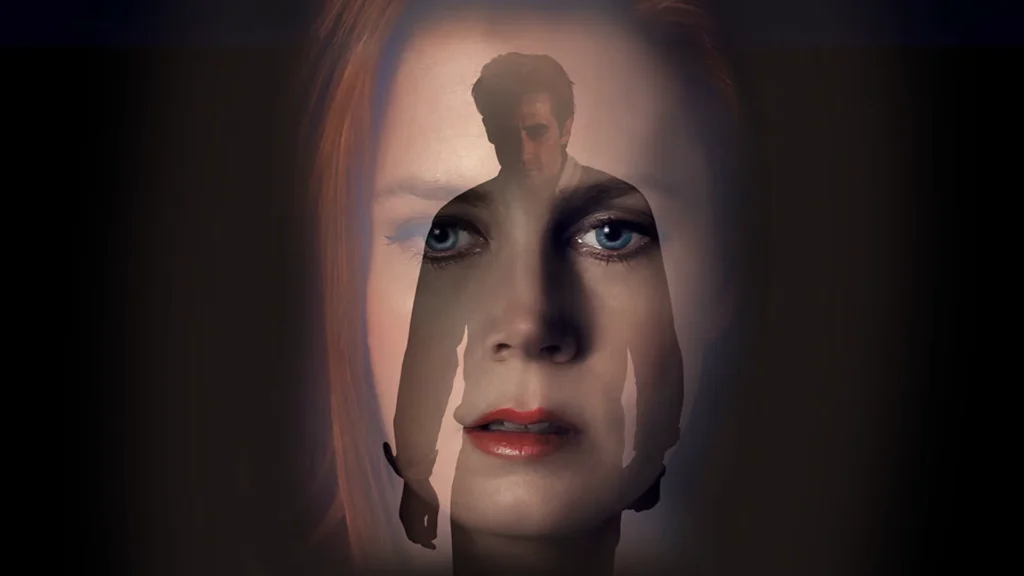What happens when a story within a story seems more real than reality? Nocturnal Animals is Tom Ford’s moody and mesmerizing 2016 thriller. It dives deep into the psychological aftermath of love, betrayal, and artistic revenge. With its chilling story, persecuting scenes, and dual times, the film questions the audience what the real is, what the metaphor is, and most importantly, what it all means.
Finally, in particular, an endless debate has arisen. Why does Edward send his disturbing novel to Susan after years of silence? What message is he trying to send? And what are we going to take from that destructive final scene?
In this breakdown, we will highlight the layered story of the film, decode the symbolism behind the novel, and find out why the end can be the most calm and coldest revenge so far and try to break down the ending of Nocturnal Animals.
⚠️Spoiler Warning: This article contains major plot details from the film Nocturnal Animals (2016). Proceed with caution if you haven’t watched it yet!
Nocturnal Animals Plot Recap: Two Stories, One Message

Nocturnal Animals is like a psychological smoothie – blended with heartbreak, revenge, and just a splash of stylish emotional tantrum. At the center of this cinematic mood board is Susan Morrow (Amy Adams), an art gallery owner whose life is as frosty and hollow as the modern art she curates.
One day, out of the blue, Susan receives a manuscript from her long-lost ex-husband, Edward Sheffield (Jake Gyllenhaal). The title of the manuscript? Nocturnal Animals. The dedication? Yep, it’s got Susan’s name on it. The vibe? Uncomfortably personal, disturbingly intense – like a breakup letter wrapped in a psychological thriller.
As Susan starts reading, we’re plunged into the gritty, gut-punching fictional world of Tony Hastings (also played by Jake Gyllenhaal). Tony’s on a soul-crushing journey after a roadside horror show ends in the unthinkable – the murder of his wife and daughter.
But here’s where it gets juicy: the more Susan reads it, the more her perfectly composed life starts to crumble. Turns out, this manuscript might be more than just a novel; it might probably be Edward’s deeply personal “here’s what you did to me” breakup letter, wrapped in blood and paperback pages. Guilt? Check. Regret? Double Check. Existential unraveling? Oh, you bet!
Nocturnal Animals Ending Explained: The Dinner That Never Happens
After being emotionally rattled by Edward’s story, Susan decides to go for some good old face-to-face closure. She reaches out, suggests a dinner meet-up, and starts prepping like she’s heading into a battle or maybe a date. The dress is on point, the wedding ring is off, and it looks like she’s anticipating a second chance.
And Edward? He never shows up. No text. No call. Nothing! Just pure uncut silence. Ghosting level: Masterclass!
So, What Does This All Really Mean?

Buckle up, we’re diving headfirst into the emotional tornado that is the ending of Nocturnal Animals. It’s mysterious, it’s moody, and it definitely left Susan (and us) totally confused. Let’s break it down, conspiracy board style!
1. The Novel as a Metaphorical Weapon
The core interpretation of the ending of Nocturnal Animals is that Edward’s manuscript is a calculated act of emotional revenge. The whole Tony tragedy – helplessness, heartbreak, revenge- feels less like fiction and mirrors the pain Edward endured in the relationship with Susan. Let’s count the burns:
- She left him for a more “successful” man, who, by the way, is now cheating on her.
- She secretly aborted their child.
- She dismissed his writing as a frivolous dream.
So Edward writes his pain into poetry. Trauma into typeface. This art is vengeance, and it hurts real bad!
2. The Stand Up = The Final Blow
Edward’s decision not to show up for dinner is the final twist of the knife. Susan expected a reunion or redemption, but what she got was abandonment. By leaving her waiting in that lonely restaurant, Edward flips the script. This time, he walks away. He chooses to leave her behind. His absence screams louder than any confrontation ever could: “Now you know how it feels”.
3. Edward has moved on, but has Susan?
Some believed that Edward never intended to reconcile. The novel was the closure for him. Writing it down allowed him to process heartbreak, anger, and betrayal. And now he’s finally free. Susan, on the other hand, is stuck.
Her world is loveless and sterile. Her art is hollow. Her marriage is crumbling. And when she realizes that Edward, the man she once dismissed, has created something raw and beautiful and no longer needs her, it breaks her. The look on her face in the last shot is not just sadness, it’s realization!
Also, read When Evil Lurks Ending Explained: Evil Wins, and It’s Not Even Close
Themes: Revenge, Regret, and the Cost of Choices
This movie isn’t just trying to make you sad; it’s out there asking people philosophical questions!
- Can you ever outrun the heartbreak you cause?
- Is revenge always petty, or can it be poetic?
- Can writing be the ultimate clapback?
Whether you see it as Edward’s mic drop revenge, a tragic missed connection, or just really uncomfortable closure, it works. And it hurts, beautifully.
Unanswered Questions to Ponder

But hey, just when you think you’ve got it all figured out, think again! Nocturnal Animals ending hits you with a thousand-yard stare and leaves you hanging like an unanswered text. So now, you’re left spiraling through an existential maze, holding a cup of coffee and asking yourself stuff like:
- Did Susan really want forgiveness, or was she just craving emotional validation?
- Did Edward always plan to ghost her, or did he chicken out at the last second?
- Is the Novel literal revenge or just a metaphor for Susan’s self-loathing?
The movie does not answer these because you’re supposed to sit with discomfort, just like Susan.
Also, read I Know What You Did Last Summer Ending Explained: Secrets, Hooks, and One Last Scream
Conclusion: A Revenge Story Disguised as a Love Letter
The ending of Nocturnal Animals does not deliver closure or reunion. Instead, it offers something darker and more realistic: the lingering sting of regret, the power of storytelling, and the quiet devastation of lost chances.
Edward’s silent no-show is the most dramatic, most passive-aggressive “I’m done” in cinema history. And honestly, most iconic! Because sometimes, the loudest message is no message at all…
Frequently Asked Questions
1. Why doesn’t Edward show up at the end of Nocturnal Animals?
Edward’s absence is deliberate. By agreeing to meet Susan and then never arriving, he delivers a quiet but devastating form of revenge. The moment leaves Susan waiting alone, forcing her to confront the emotional damage she caused him years earlier. His silence proves that he no longer needs closure or her in his life.
2. What actually happens at the end of Nocturnal Animals?
The ending operates on two levels. In the novel-within-the-film, Tony kills the man responsible for his family’s death but accidentally shoots himself, turning revenge into a hollow victory. In reality, Susan finishes reading Edward’s manuscript, feels the weight of her guilt, and reaches out to him. Edward accepts the dinner invitation, then never shows up, leaving her with nothing but the truth.
3. Are Edward and Tony the same person?
Not literally. Tony is a fictional character created by Edward, but he clearly functions as a stand-in. Tony embodies Edward’s vulnerability, loss, and sense of betrayal, reflecting how Susan once dismissed Edward as weak and unimportant.
4. Is the book in Nocturnal Animals a real novel?
No. The manuscript is fictional within the film. Edward writes it specifically for Susan, using violence and grief as a metaphorical message. The book isn’t just a story; it’s Edward’s way of confronting her with the emotional wounds she helped create.